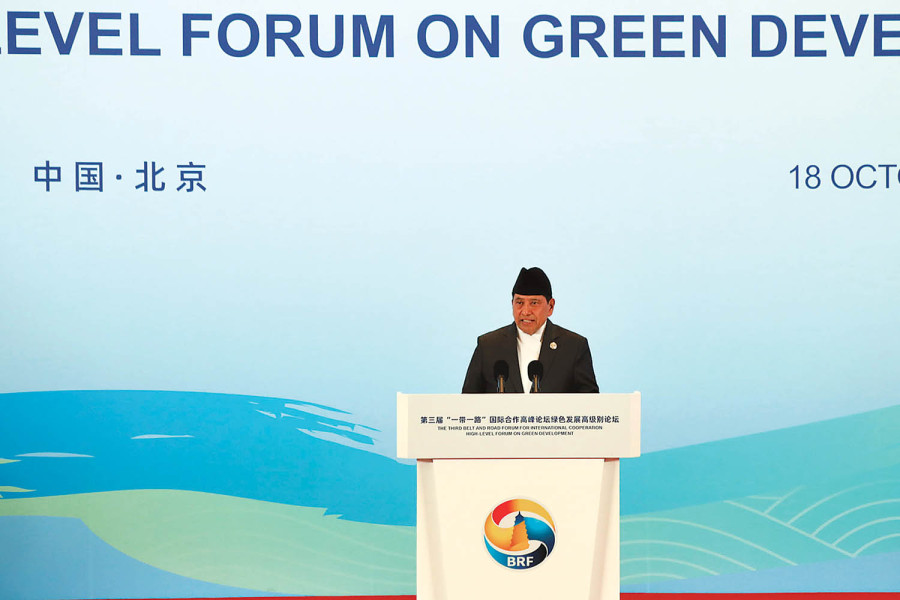National
Two projects of Nepal listed as Belt and Road outcome
However, rather than being new ventures, the projects are already in operation in Nepal. The outcome document remains mum on Pokhara airport.
Post Report
Two mini projects of Nepal have been listed in the outcome document of the third Belt and Road Forum for International Cooperation (BRF), which concluded on October 18 in Beijing. Deputy Prime Minister and Minister for Home Affairs Narayan Kaji Shrestha had participated in the forum.
The Chinese side, in a statement released on October 18, mentioned the Panda Pack project and Amity Living Water Project as part of the Belt and Road Initiative. However, rather than being new ventures, the projects are already in operation in Nepal.
According to the website of the Panda Pack project, it was launched in February 2019 by the China Foundation for Poverty Alleviation jointly with Alibaba Philanthropy. “The Panda Pack Project aims to improve the basic learning conditions of primary school students in need and help the development of quality education in beneficiary countries. With the theme of ‘Gifts for Panda Land’, it embodies the good wishes of the Chinese people to the children in beneficiary countries, and express the friendship of Chinese people and strengthens people-to-people ties,” says the website.
The Panda Pack Project had helped 742,151 students by 2020, said the website. The project is being implemented in Myanmar, Nepal, Ethiopia, Cambodia, Laos, Pakistan and Namibia.
According to the website of the China Foundation for Poverty Alleviation, it was registered in Lalitpur in 2015 as a nongovernmental organisation (NGO). Through its Nepal office, the CFPA has successfully implemented a series of development aid projects based on local needs. The programmes centre on United Nations Sustainable Development Goals such as no poverty, zero hunger, good health and well being, quality education, clean water and sanitation, decent work and economic growth.
The outcome document of the second Belt and Road conference in 2019 had incorporated the Nepal-China Trans-Himalayan Multi-Dimensional Connectivity Network, including cross-border railway. Nepal signed China’s BRI framework agreement in 2017 but not a single project, its critics in Nepal argue, has been taken up or negotiated since.
Under this framework, China has already started conducting a feasibility study, which is expected to be completed in another four years, of Kerung-Kathmandu railway.
Unlike what Chinese ambassador to Nepal Chen Song had stated about the Pokhara International Airport—that it is a flagship BRI project in Nepal—the outcome document remains mum on the airport.
One day ahead of the inauguration of the Pokhara airport on December 31, 2022, the Chinese Embassy wrote in its Twitter (X) account: “This [Pokhara airport] is the flagship project of the China-Nepal BRI cooperation.”
The Chinese embassy also congratulated the government and people of Nepal on the connectivity milestone. But the statements by the embassy and Chinese Ambassador to Nepal Chen Song were countered by the government of Nepal, saying that not a single project under the flagship of BRI has been signed between the two countries.
Both Foreign Minister NP Saud and Tourism Minister Sudan Kirati had denied the Chinese claim. After strong reservations and denial from ministers and senior government officials, the Chinese side has probably backtracked on its claim, a senior official at the Prime Minister’s Office said, asking not to be named. “As the BRI is a bilateral pact, any decision taken under the framework should be accepted by both sides.”
The second project included in the outcome document of the third BRI conference is the Amity Living Water Project in Nepal. The X account of Amity Living mentions that the organisation is a faith-based Chinese NGO dedicated to working for social development around the world. The NGO works in the water and sanitation sector.
According to the Social Welfare Council’s website, Transform Nepal Sarlahi has on different occasions received donations from the Amity Foundation China.




 10.12°C Kathmandu
10.12°C Kathmandu














